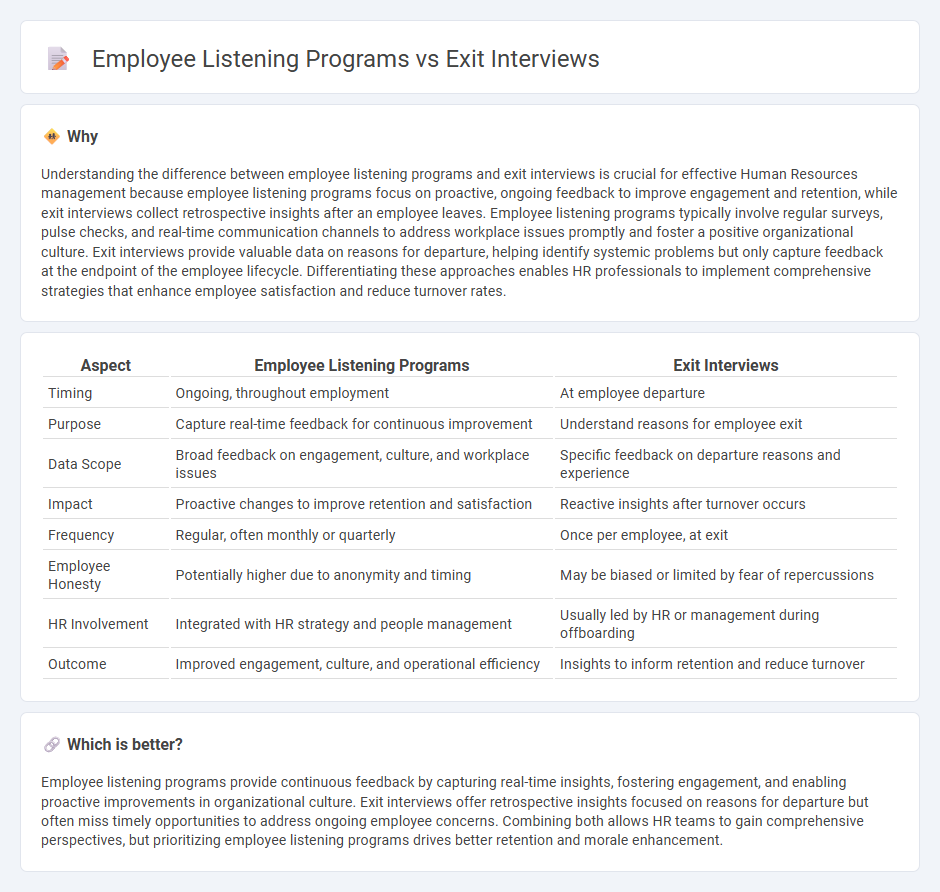
Employee listening programs capture continuous feedback through surveys, focus groups, and digital platforms to improve workplace culture and engagement proactively. Exit interviews provide retrospective insights from departing employees, highlighting reasons for turnover and areas needing improvement. Explore more about how integrating both approaches enhances overall HR strategy and employee retention.
Why it is important
Understanding the difference between employee listening programs and exit interviews is crucial for effective Human Resources management because employee listening programs focus on proactive, ongoing feedback to improve engagement and retention, while exit interviews collect retrospective insights after an employee leaves. Employee listening programs typically involve regular surveys, pulse checks, and real-time communication channels to address workplace issues promptly and foster a positive organizational culture. Exit interviews provide valuable data on reasons for departure, helping identify systemic problems but only capture feedback at the endpoint of the employee lifecycle. Differentiating these approaches enables HR professionals to implement comprehensive strategies that enhance employee satisfaction and reduce turnover rates.
Comparison Table
| Aspect | Employee Listening Programs | Exit Interviews |
|---|---|---|
| Timing | Ongoing, throughout employment | At employee departure |
| Purpose | Capture real-time feedback for continuous improvement | Understand reasons for employee exit |
| Data Scope | Broad feedback on engagement, culture, and workplace issues | Specific feedback on departure reasons and experience |
| Impact | Proactive changes to improve retention and satisfaction | Reactive insights after turnover occurs |
| Frequency | Regular, often monthly or quarterly | Once per employee, at exit |
| Employee Honesty | Potentially higher due to anonymity and timing | May be biased or limited by fear of repercussions |
| HR Involvement | Integrated with HR strategy and people management | Usually led by HR or management during offboarding |
| Outcome | Improved engagement, culture, and operational efficiency | Insights to inform retention and reduce turnover |
Which is better?
Employee listening programs provide continuous feedback by capturing real-time insights, fostering engagement, and enabling proactive improvements in organizational culture. Exit interviews offer retrospective insights focused on reasons for departure but often miss timely opportunities to address ongoing employee concerns. Combining both allows HR teams to gain comprehensive perspectives, but prioritizing employee listening programs drives better retention and morale enhancement.
Connection
Employee listening programs and exit interviews are integral components of effective Human Resources strategies aimed at enhancing workforce engagement and retention. Employee listening programs continuously gather feedback through surveys, suggestion boxes, and pulse polls, creating a proactive approach to identifying workplace issues before they lead to turnover. Exit interviews provide critical insights into the reasons behind employee departures, complementing listening programs by validating concerns and informing HR initiatives to improve organizational culture and reduce attrition rates.
Key Terms
**Exit Interviews:**
Exit interviews provide structured, retrospective feedback from departing employees, offering valuable insights into organizational weaknesses, management issues, and workplace culture. These interviews help identify trends in turnover, uncover reasons for employee dissatisfaction, and inform strategic improvements to reduce attrition. Discover how leveraging exit interviews can transform retention strategies and enhance overall employee engagement.
Employee Feedback
Exit interviews capture candid insights from departing employees, revealing reasons for turnover and areas needing organizational improvement. Employee listening programs gather ongoing feedback from current staff through surveys, pulse checks, and open forums to enhance engagement and workplace culture. Explore more to understand how these feedback mechanisms drive retention and organizational success.
Turnover Reasons
Exit interviews provide targeted insights into turnover reasons by capturing departing employees' feedback on job satisfaction, management, and workplace environment. Employee listening programs gather ongoing, real-time data from current employees through surveys and feedback channels, offering a broader understanding of turnover risks before they result in exit. Explore more to optimize your retention strategy using both methods effectively.
Source and External Links
Effective Exit Interviews: Strategies & Tips - BambooHR - Exit interviews allow a departing employee and their organization to exchange information about the reasons for leaving and feedback on the work experience, typically conducted in person or via survey, but are not legally required.
Exit interview: What is it and the questions to expect - Personio - Exit interviews are final conversations, usually one-on-one with HR in a neutral setting, designed to gain honest insights on how to improve the organization, with confidentiality and a focus on the employee's reasons for leaving.
12 Exit Interview Question Examples (With Tips) - Indeed - Companies conduct exit interviews to collect candid feedback on workplace culture, management, and job satisfaction in order to reduce turnover and improve policies for future employees.
 dowidth.com
dowidth.com